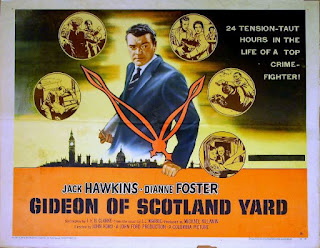Gideon of
Scotland Yard (aka Gideon’s Day) is an interesting oddity from director John
Ford, with not a horse or cowboy in sight. The script from T.E.B Clarke (the
man behind Ealing classics The Lavender Hill Mob and The Titfield Thunderbolt)
has no real plot, instead giving us a typical, if rather busy day in the life
of Chief Inspector George Gideon. Our hero has to investigate a hit-and-run
murder of a corrupt colleague, a bank robbery, a payroll theft, the
intimidation of one of his underworld sources, and a psychotic sex killer.
By going with a
series of sub-plots rather than a linear story or MacGuffin, none of the
characters, situations or investigations are gone into in any depth, but the
film moves along at such a pace that it never becomes boring, and the light-hearted
tone makes it enjoyable to watch.
Gideon fulfils many
typical fictional police officer tropes: he is gruff, but fair, utterly
incorruptible, calm under pressure and unable to balance work and home life. He
is not a Sherlock Holmes style detective, and with no baffling mysteries to
solve, most of his crime fighting seems to consist of getting tips from
informants or other officers and then persuading the criminals to give up. In
one memorable scene, he calmly explains to one villain the consequences of his
actions, while puffing on his pipe, seemingly oblivious to the gun pointed at
his chest. Elsewhere he tells a group of bank robbers “Sorry to inform you, but
we have the place surrounded, so come on out, gentlemen, and save us all trouble”.
The other characters, such the put-upon but supportive wife, the Cock-err-nee
informant and his gin-guzzling wife, and the wet-behind-the-ears constable are
similarly two-dimensional and played broadly, and mostly for laughs, by the
actors.
The most
fascinating aspect of the film is the glimpse into the era of London, not much
more than a decade after World War 2, when the UK still had capital punishment
but did not yet have Rock and Roll. The world presented is one of affluence, at
least from that we see of Gideon’s home life, and poverty, as represented by a
huge swarm of urchins at a Church Boys Club. It is also in many ways a more innocent
world that seems, at times, like a different planet from the cynical, knowing
one that crime films and TV shows inhabit today and one that makes the idea of
things such as police corruption or sexual murder even more shocking.
The only real
mystery with Gideon of Scotland Yard is why John Ford made it, as the movie lacks
his usual themes such as masculine identity, or the mythology of the United
States. Competently put together, and enjoyable to watch, but is it so devoid of
any distinct identity, it could be the work of any capable journeyman director.

No comments:
Post a Comment